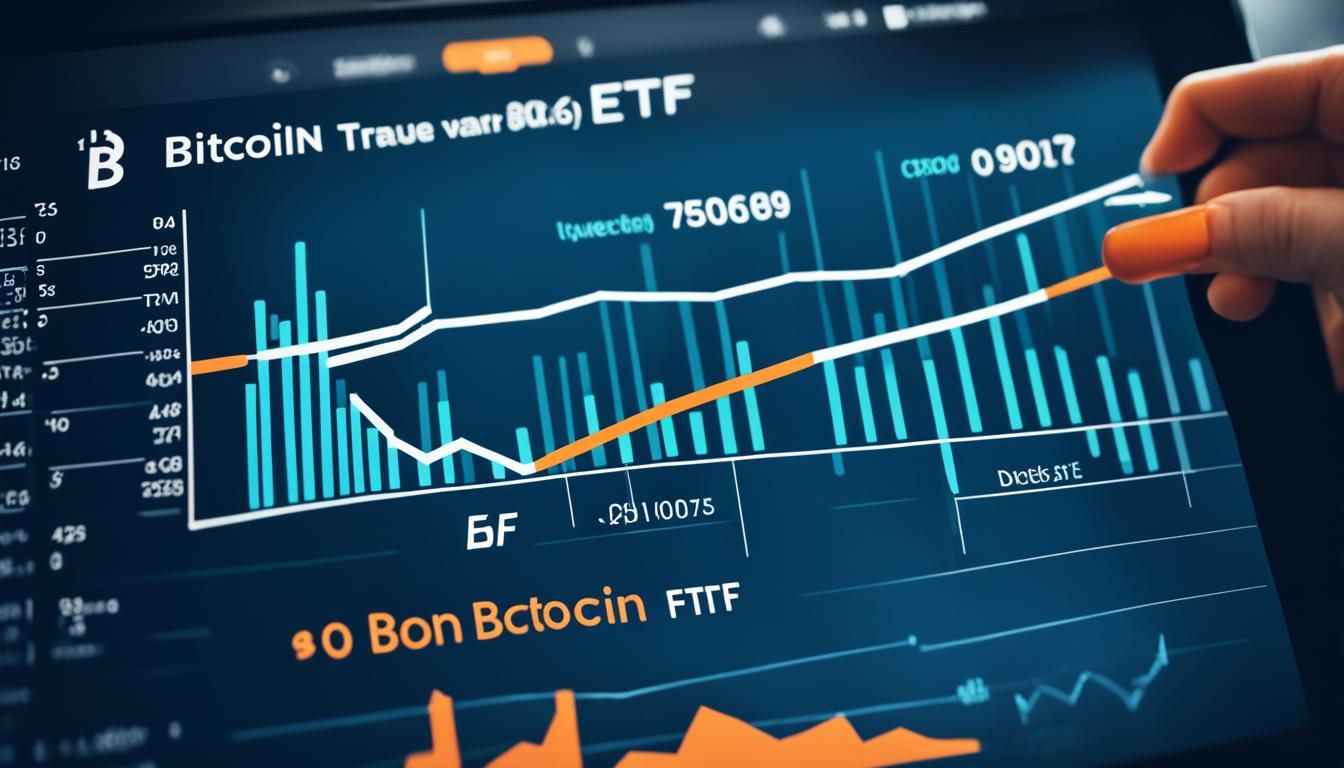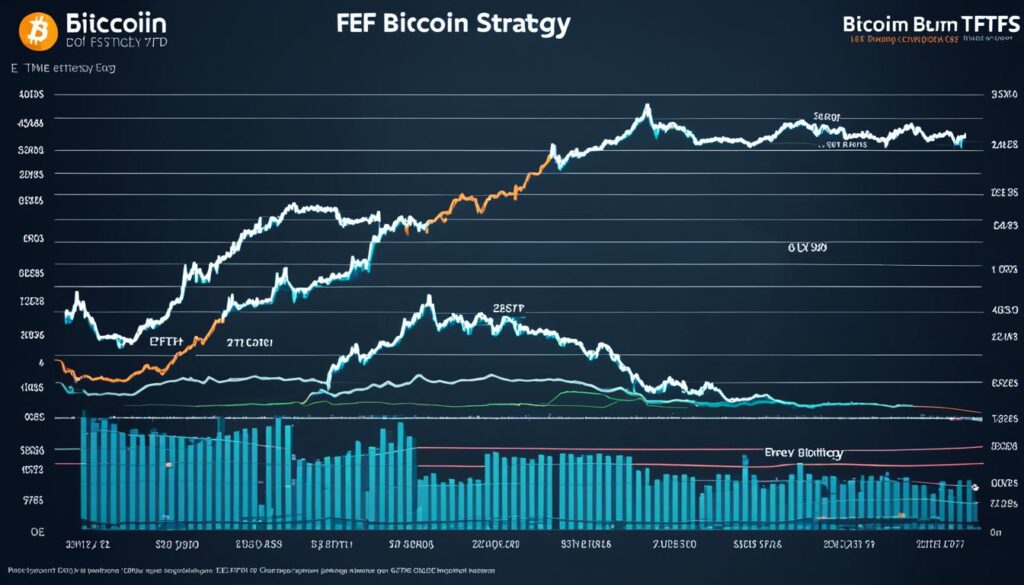Bitcoin IRA
Bitcoin ETF Guide: Invest Smarter Today
Explore the evolving landscape of Bitcoin ETFs in the US and learn how to diversify your portfolio with this emerging digital asset class.

Are you ready to explore new investment opportunities in the world of cryptocurrencies? With the recent approval of spot Bitcoin ETFs by the Securities and Exchange Commission (SEC), investors now have a regulated and convenient way to gain exposure to the price movements of Bitcoin. But how exactly do Bitcoin ETFs work, and what should you consider before diving into this emerging digital asset class?
Key Takeaways:
- Spot Bitcoin ETFs track the price of Bitcoin directly and provide a hassle-free way to invest in the cryptocurrency.
- Each approved ETF has its own fee structure, so make sure to compare and evaluate the costs before making an investment decision.
- Custodianship risks are associated with spot Bitcoin ETFs, as the financial stability of the custodian can impact the safety of your investment.
- The approval of Bitcoin ETFs is expected to have a positive impact on the price of Bitcoin and drive demand from investors.
- Stay informed about regulatory developments and market analysis to make informed decisions when investing in Bitcoin ETFs.
Understanding Spot Bitcoin ETFs
A spot Bitcoin ETF is an exchange-traded fund that directly tracks the price of Bitcoin by holding a large amount of the cryptocurrency itself. It is similar to a spot gold ETF, which holds physical gold bullion. The recently approved spot Bitcoin ETFs are the first cryptocurrency funds to trade on a major exchange and hold Bitcoin directly. Investors can now easily gain exposure to Bitcoin through these ETFs.
With the approval of spot Bitcoin ETFs, investors have a new avenue to participate in the cryptocurrency market. These ETFs function as investment vehicles that provide a convenient and regulated way to invest in Bitcoin. By holding a significant amount of Bitcoin, spot Bitcoin ETFs allow investors to directly track the price of the cryptocurrency and potentially benefit from its price movements.
In comparison to other investment options in the cryptocurrency space, spot Bitcoin ETFs offer several advantages. First, they provide a level of accessibility and simplicity that appeals to a wide range of investors. Investing in Bitcoin through a spot ETF is often more convenient than buying and securely storing the cryptocurrency directly. Additionally, spot Bitcoin ETFs are regulated by the SEC, providing a higher level of investor protection and oversight.
Furthermore, spot Bitcoin ETFs offer opportunities for diversification and risk management within an investment portfolio. By including an allocation to Bitcoin, investors can potentially benefit from the growth potential of the cryptocurrency while mitigating some of the risks associated with the volatile nature of the market.
The approval of spot Bitcoin ETFs represents a significant development in the regulatory landscape for cryptocurrencies. It demonstrates a growing acceptance and recognition of digital assets as legitimate investment opportunities. As regulatory developments continue to evolve, it is important for investors to stay informed about the latest updates and understand the potential impact on their investment strategies.
Key Points to Understand:
- A spot Bitcoin ETF directly tracks the price of Bitcoin by holding the cryptocurrency itself.
- Spot Bitcoin ETFs are the first cryptocurrency funds to trade on a major exchange and hold Bitcoin directly.
- These ETFs provide a regulated and convenient way for investors to gain exposure to Bitcoin’s price movements.
- Spot Bitcoin ETFs offer advantages in terms of accessibility, simplicity, and regulated oversight compared to other investment options in the cryptocurrency market.
- Investing in spot Bitcoin ETFs can provide opportunities for diversification and risk management within an investment portfolio.
Top Approved Spot Bitcoin ETFs by Fee
The approved spot Bitcoin ETFs offer investors various fee structures. Below, you will find a list of the approved ETFs and their respective fees, sorted from lowest to highest:
| ETF Name | Fee |
|---|---|
| Franklin Templeton Digital Holdings Trust (EZBC) | Fee waived until Aug. 2, 2024, or first $10 billion in fund assets, whichever comes first. |
| Bitwise Bitcoin ETF (BITB) | Fee waived for first six months of trading or first $1 billion in fund assets, whichever comes first. |
| VanEck Bitcoin Trust (HODL) | Fee waived until Mar. 31, 2025, or first $1.5 billion in fund assets, whichever comes first. |
| Ark 21Shares Bitcoin ETF (ARKB) | Fee waived for first six months of trading or first $1 billion in fund assets, whichever comes first. |
| iShares Bitcoin Trust (IBIT) | Fee reduced to 0.12% for first 12 months of trading or first $5 billion in fund assets, whichever comes first. |
| Fidelity Wise Origin Bitcoin Fund (FBTC) | Fee waived until Aug. 1, 2024. |
| WisdomTree Bitcoin Fund (BTCW) | Fee waived for first six months of trading or first $1 billion in fund assets, whichever comes first. |
| Invesco Galaxy Bitcoin ETF (BTCO) | Fee waived for first six months of trading or first $5 billion in fund assets, whichever comes first. |
| Valkyrie Bitcoin Fund (BRRR) | Fee waived for first three months of trading. |
| Hashdex Bitcoin ETF (DEFI) | Fee waived for first two months of trading. |
| Grayscale Bitcoin Trust (GBTC) | Management fee applies. |
As an investor, it’s important to consider the fees associated with each ETF when making a decision. The fee structure can impact the overall return on investment and should be carefully evaluated in conjunction with other factors, such as the fund’s performance history and the investor’s risk profile.

What are Bitcoin Strategy ETFs?
Bitcoin strategy ETFs provide investors with a way to track the price movements of Bitcoin indirectly. These ETFs offer exposure to Bitcoin’s market performance through investments in Bitcoin futures or Bitcoin mining stocks. While they may not deliver the exact same returns as holding the cryptocurrency itself, they serve as an alternative investment option for those interested in the potential opportunities of the digital asset market.
Investing in a Bitcoin strategy ETF allows individuals to participate in the growth potential of Bitcoin without the need to directly buy and hold the cryptocurrency. This provides convenience and accessibility for investors who may not have the technical expertise or desire to manage their own digital assets.
Popular Bitcoin strategy ETFs in the market include:
- Global X Blockchain & Bitcoin Strategy ETF (BITS)
- Valkyrie Bitcoin Miners ETF (WGMI)
- ProShares Bitcoin Strategy ETF (BITO)
These ETFs offer different investment strategies and varying degrees of exposure to the Bitcoin market. It is important for investors to assess their risk tolerance, investment goals, and the underlying assets and strategies of each ETF before making investment decisions.
Benefits of Bitcoin Strategy ETFs
Investing in Bitcoin strategy ETFs can provide several benefits:
- Diversification: Bitcoin strategy ETFs offer diversification within the digital asset space. By investing in a range of Bitcoin-related assets, such as futures or mining stocks, investors can potentially spread their risk and capture different aspects of the market.
- Regulated Structure: ETFs are regulated investment vehicles, providing investors with a level of oversight and transparency. This can offer a sense of security and mitigate some of the concerns associated with investing in cryptocurrencies directly.
- Convenience: Bitcoin strategy ETFs trade on established stock exchanges, making them easily accessible to investors. They can be bought and sold through brokerage accounts, similar to traditional stocks or ETFs, providing ease of transaction and liquidity.
It is important to note that, like any investment, Bitcoin strategy ETFs come with their own risks. Investors should carefully consider their investment objectives and conduct thorough research before making any investment decisions.
Bitcoin Strategy ETFs vs. Spot Bitcoin ETFs
While Bitcoin strategy ETFs offer exposure to Bitcoin indirectly, spot Bitcoin ETFs track the price of Bitcoin directly by holding the cryptocurrency itself. Spot Bitcoin ETFs, like the recently approved ones, aim to replicate the performance of Bitcoin by holding the underlying asset.
The choice between Bitcoin strategy ETFs and spot Bitcoin ETFs depends on an investor’s preferences, risk appetite, and investment goals. Some investors may prefer the convenience and regulatory oversight provided by Bitcoin strategy ETFs, while others may opt for the direct exposure to Bitcoin offered by spot Bitcoin ETFs.
The Future of Bitcoin Strategy ETFs
As the cryptocurrency market evolves and gains more mainstream acceptance, the demand for Bitcoin strategy ETFs is expected to grow. The success and performance of approved Bitcoin ETFs, combined with increasing investor interest, could lead to the introduction of more innovative and diversified Bitcoin strategy ETFs in the future.
Investors should stay informed about the latest developments in the cryptocurrency market and regulatory landscape to make educated investment decisions regarding Bitcoin strategy ETFs.
Top Bitcoin Strategy ETFs by Fee
| ETF Name | Fee |
|---|---|
| Global X Blockchain & Bitcoin Strategy ETF (BITS) | 0.35% |
| Valkyrie Bitcoin Miners ETF (WGMI) | 0.50% |
| Bitwise Bitcoin Strategy Optimum Roll ETF (BITC) | 0.60% |
| ProShares Bitcoin Strategy ETF (BITO) | 0.75% |
| Bitwise Bitcoin and Ether Equal Weight Strategy ETF (BTOP) | 1.00% |
| Valkyrie Bitcoin and Ether Strategy ETF (BTF) | 1.25% |
| ProShares Bitcoin & Ether Market Cap Weight Strategy ETF (BETH) | 1.50% |
| ProShares Bitcoin & Ether Equal Weight Strategy ETF (BETE) | 1.75% |
When considering investment opportunities in Bitcoin strategy ETFs, it is important to evaluate the associated fees. The top Bitcoin strategy ETFs by fee are as follows:
- Global X Blockchain & Bitcoin Strategy ETF (BITS) – With a fee of 0.35%, this ETF offers a relatively low-cost option for investors.
- Valkyrie Bitcoin Miners ETF (WGMI) – This ETF has a fee of 0.50%, providing investors with exposure to the Bitcoin mining sector.
- Bitwise Bitcoin Strategy Optimum Roll ETF (BITC) – With a fee of 0.60%, this ETF seeks to optimize the Bitcoin futures roll yield.
- ProShares Bitcoin Strategy ETF (BITO) – This ETF has a fee of 0.75% and aims to provide investors with exposure to Bitcoin’s price movements.
- Bitwise Bitcoin and Ether Equal Weight Strategy ETF (BTOP) – With a fee of 1.00%, this ETF offers a balanced approach to investing in Bitcoin and Ether.
- Valkyrie Bitcoin and Ether Strategy ETF (BTF) – This ETF has a fee of 1.25% and focuses on providing investors with exposure to both Bitcoin and Ether.
- ProShares Bitcoin & Ether Market Cap Weight Strategy ETF (BETH) – With a fee of 1.50%, this ETF aims to reflect the market capitalization of Bitcoin and Ether.
- ProShares Bitcoin & Ether Equal Weight Strategy ETF (BETE) – This ETF has a fee of 1.75% and provides equal-weighted exposure to Bitcoin and Ether.

Comparing the fees of different Bitcoin strategy ETFs can help investors make informed decisions based on their investment goals and risk appetite. It is essential to consider both the fees and the investment opportunities offered by each ETF to determine the most suitable option for individual portfolios.
The Bitcoin ETF Price War
The approval of spot Bitcoin ETFs has ignited a fierce battle among issuers, resulting in a price war that is ultimately benefiting investors. As competition intensifies in the market, issuers are slashing fees and offering promotional fee waivers to attract investors to their Bitcoin ETFs. This price war has created lucrative investment opportunities and reduced costs associated with trading Bitcoin ETFs.
When considering a Bitcoin ETF, it’s crucial for investors to carefully evaluate the fees associated with each fund. With issuers vying for market share, many have significantly reduced their fees to stay competitive. By choosing a Bitcoin ETF with lower fees, investors can maximize their potential returns and minimize their expenses. It’s important to note that fees can directly impact an investor’s overall investment performance.

The promotional fee waivers offered by issuers further amplify the benefits for investors. These waivers provide temporary relief from certain fees for a specified period or until a specific fund asset threshold is reached. Savvy investors can take advantage of these offers to access Bitcoin ETFs at a reduced cost.
Investors should closely compare the fees and promotional offers of different Bitcoin ETFs before making their investment decisions. By choosing the right fund, investors can align their investment goals and risk tolerance with an ETF that offers competitive fees and attractive promotional benefits.
The ongoing price war in the Bitcoin ETF space underscores the continuous innovation and competition in the financial technology industry. As more players enter the market and regulatory frameworks evolve, investors can expect to see further fee reductions and promotional offers that enhance the accessibility and affordability of Bitcoin ETFs.
Comparison of Bitcoin ETF Fees
| Bitcoin ETF | Fee Structure |
|---|---|
| Franklin Templeton Digital Holdings Trust (EZBC) | Fee waived until Aug. 2, 2024 or first $10 billion in fund assets, whichever comes first. |
| Bitwise Bitcoin ETF (BITB) | Fee waived for first six months of trading or first $1 billion in fund assets, whichever comes first. |
| VanEck Bitcoin Trust (HODL) | Fee waived until Mar. 31, 2025 or first $1.5 billion in fund assets, whichever comes first. |
| Ark 21Shares Bitcoin ETF (ARKB) | Fee waived for first six months of trading or first $1 billion in fund assets, whichever comes first. |
| iShares Bitcoin Trust (IBIT) | Fee reduced to 0.12% for first 12 months of trading or first $5 billion in fund assets, whichever comes first. |
| Fidelity Wise Origin Bitcoin Fund (FBTC) | Fee waived until Aug. 1, 2024. |
| WisdomTree Bitcoin Fund (BTCW) | Fee waived for first six months of trading or first $1 billion in fund assets, whichever comes first. |
| Invesco Galaxy Bitcoin ETF (BTCO) | Fee waived for first six months of trading or first $5 billion in fund assets, whichever comes first. |
| Valkyrie Bitcoin Fund (BRRR) | Fee waived for first three months of trading. |
| Hashdex Bitcoin ETF (DEFI) | Fee waived for first two months of trading. |
| Grayscale Bitcoin Trust (GBTC) | Management fee applies. |
Custodianship Risks of Spot Bitcoin ETFs
When investing in spot Bitcoin ETFs, it’s essential to consider the custodianship risks associated with these funds. Most spot Bitcoin ETFs rely on third-party custodians, such as Coinbase or Gemini, to store the Bitcoin they hold. While these custodians play a crucial role in ensuring the security of the ETF’s holdings, there are potential implications related to their financial stability.
The custodian’s financial stability directly impacts the safety of the Bitcoin held by the ETF. If a custodian faces financial difficulties or gets hacked, there is a risk that the ETF’s holdings may be compromised or lost entirely. This risk is particularly relevant in the cryptocurrency space, where security breaches and cyber attacks are inherent risks.
However, it is vital to highlight that measures are in place to mitigate these custodianship risks. Reputable custodians often have robust security protocols, including offline storage and multi-signature wallets, to protect the assets they hold on behalf of the ETF. Additionally, custodianship is regulated and subject to scrutiny by regulatory authorities to ensure compliance with industry standards and best practices.
Investors considering spot Bitcoin ETFs should carefully evaluate the custodial arrangements and the reputation of the custodian being used. Conducting due diligence on the custodian’s security practices, financial stability, insurance coverage, and regulatory compliance is essential to assess the level of risk associated with the ETF.
Overall, while custodianship risks exist in spot Bitcoin ETFs, prudent investors can take steps to mitigate these risks by choosing ETFs with reputable custodians, thorough security protocols, and proper risk management strategies.
Example Quote:
“Investors must exercise due diligence when investing in spot Bitcoin ETFs and consider the custodianship risks associated with these funds. While third-party custodians play a vital role in safeguarding the ETF’s holdings, the financial stability of the custodian directly impacts the safety of investors’ assets.”
– Jane Peterson, Chief Investment Officer at CryptoCapital
| Custodian | Security Measures | Regulatory Compliance | Financial Stability |
|---|---|---|---|
| Coinbase | Offline storage, multi-signature wallets | Fully regulated by authorities | Strong financial backing |
| Gemini | Offline storage, multi-signature wallets | Fully regulated by authorities | Strong financial backing |
| Other custodian | Varies based on custodian | Varies based on custodian | Varies based on custodian |

Impact of Approvals on Bitcoin and Other Crypto Investments
The recent approval of spot Bitcoin ETFs by the Securities and Exchange Commission (SEC) is expected to have a significant impact on the cryptocurrency market. These approvals open up new opportunities for investors looking to diversify their portfolios with digital assets.
One of the key effects of these approvals is the positive impact on the price of Bitcoin itself. With the introduction of Bitcoin ETFs, more investors now have access to the cryptocurrency, leading to increased demand. As a result, the price of Bitcoin is likely to experience upward pressure, potentially benefiting existing Bitcoin holders and attracting new investors.
Furthermore, the approval of spot Bitcoin ETFs could also pave the way for the introduction of other cryptocurrency ETFs. For example, an Ethereum ETF may be on the horizon, allowing investors to gain exposure to the second-largest cryptocurrency by market capitalization.
It is important, however, to manage expectations regarding the immediate impact of these ETF approvals. While they are expected to drive demand and increase Bitcoin’s price, it may not necessarily result in a significant influx of funds in the short term. Investors should remain vigilant and consider the long-term potential and risks associated with cryptocurrency investments.
“The approval of spot Bitcoin ETFs is a significant milestone for the cryptocurrency industry. It enhances the legitimacy and accessibility of Bitcoin as an investment asset. We expect this development to attract more institutional and retail investors, driving further growth in the cryptocurrency market.”
Investment Opportunities in the Cryptocurrency Market
With the approval of spot Bitcoin ETFs, investors now have more investment opportunities in the cryptocurrency market. These ETFs provide a regulated and convenient way to gain exposure to the price movements of Bitcoin. They offer a level of accessibility and security that was previously unavailable to many investors.
Investing in Bitcoin ETFs allows individuals and institutions to diversify their portfolios and potentially benefit from the growth of the cryptocurrency market. It offers an alternative investment avenue for those who are interested in cryptocurrencies but may not be comfortable directly holding or trading digital assets.
Additionally, the introduction of Bitcoin ETFs demonstrates the continued financial technology innovation in the cryptocurrency industry. It highlights the efforts to bridge the gap between traditional finance and the digital asset ecosystem, making it easier for investors to participate in this emerging asset class.
As always, it is crucial for investors to conduct thorough research, understand the risks involved, and consult with financial professionals before making any investment decisions in the cryptocurrency market.
| Benefits of Bitcoin ETFs | Risks of Bitcoin ETFs |
|---|---|
|
|
Conclusion
The approval of spot Bitcoin ETFs marks a significant milestone in the world of cryptocurrency investment. With these ETFs, investors now have accessible and regulated avenues to diversify their portfolios with digital assets. The convenience of gaining exposure to Bitcoin’s price movements through these ETFs opens up new investment opportunities in the financial technology innovation sector.
However, it is crucial for investors to exercise due diligence when evaluating Bitcoin ETFs. Carefully assessing factors such as fees, custodianship risks, and market analysis can contribute to making informed investment decisions. Staying informed about regulatory developments and monitoring the evolving cryptocurrency market will be key to successful investment strategies.
As the demand for Bitcoin ETFs grows, it is important to remember that risks and uncertainties are inherent in any investment. Therefore, it is advised to consult with financial professionals and conduct thorough research before entering into any cryptocurrency investment. By carefully navigating the evolving landscape of Bitcoin and other digital assets, investors can capitalize on the investment opportunities presented by these innovative financial products.FAQ
What is a spot Bitcoin ETF?
What are the fees for the approved spot Bitcoin ETFs?
What are Bitcoin strategy ETFs?
What are the fees for Bitcoin strategy ETFs?
How has the approval of spot Bitcoin ETFs impacted fees?
What are the custodianship risks of spot Bitcoin ETFs?
What is the impact of spot Bitcoin ETF approvals on Bitcoin and other crypto investments?
Lawrence founded The Liberty Portfolio to make complex retirement planning accessible to everyone. With extensive experience in investment strategies and financial planning, he leads our strategic direction and ensures that our offerings are aligned with the latest economic trends and regulations. Lawrence’s deep understanding of market dynamics and investment opportunities shapes our platform’s foundational content and tools.
Bitcoin IRA
Signs of a Legitimate Bitcoin IRA Provider
Yearning for a secure future? Discover the essential indicators of a trustworthy Bitcoin IRA provider for sound investment decisions.

When assessing a Bitcoin IRA provider, look for strong industry reputation, clear fee breakdowns, diverse investment options, and regulatory compliance. Confirm they have a proven track record, transparent fee structures, and accreditation. Opt for providers offering a range of investment options beyond Bitcoin, with expertise in digital assets and diversification. Check for adherence to IRS regulations, transparent disclosure of fees, and robust security measures. Positive client reviews, responsive customer service, and professionalism are key indicators of a reliable provider. Prioritize trustworthiness, reliability, and user-friendly platforms. Find out more about signs of a legitimate Bitcoin IRA provider.
Key Takeaways
- Strong industry reputation and compliance with regulatory bodies.
- Transparent fee structure with clear breakdowns.
- Diverse investment options beyond Bitcoin.
- Adherence to legal requirements and IRS regulations.
- Robust security protocols and high client satisfaction.
Industry Reputation and Track Record

When selecting a Bitcoin IRA provider, we prioritize those with a proven track record and strong industry reputation. Managing IRA investments involving crypto assets requires expertise and experience. A provider with a solid track record demonstrates reliability and proficiency in maneuvering the complexities of digital currencies within retirement accounts. Longevity in the industry is also essential; it signifies stability and a deep understanding of the evolving crypto landscape. By choosing a reputable provider, we can entrust our IRA investments in crypto assets to professionals who've a history of success.
Another critical aspect to take into account is regulatory compliance. Ensuring that the Bitcoin IRA provider operates within legal frameworks and meets industry standards is essential for safeguarding our investments. Accreditation adds an extra layer of assurance, indicating that the provider adheres to strict guidelines and best practices. By prioritizing regulatory compliance and accreditation, we can invest in crypto assets through our IRAs with confidence, knowing that our financial interests are protected.
Transparent Fee Structure and Information

When evaluating Bitcoin IRA providers, it's crucial to look for clear fee breakdowns and detailed disclosure of costs. Understanding transaction fees, account maintenance fees, and other charges upfront helps investors make informed decisions.
Transparent providers avoid hidden fees, providing a straightforward overview of all expenses related to managing a Bitcoin IRA.
Clear Fee Breakdown
Legitimate Bitcoin IRA providers present investors with a clear fee breakdown that outlines transaction fees, account maintenance costs, and any other relevant expenses. When evaluating a Bitcoin IRA provider, look for a transparent fee structure that guarantees you're fully aware of the costs involved.
Here are some key aspects to take into account in a clear fee breakdown:
- Detailed transaction fees for buying and selling Bitcoin within the IRA.
- Account maintenance costs to keep your Bitcoin IRA active.
- Any additional charges related to account management or services.
- Transparency in fee disclosure to avoid surprises.
- Understanding the complete cost structure for managing your Bitcoin IRA.
Detailed Disclosure of Costs
A detailed disclosure of costs in a transparent fee structure and information is essential for investors considering a Bitcoin IRA. Legitimate providers offer clarity on fees such as transaction costs and maintenance charges, ensuring investors are well-informed. Transparent fee structures build trust by revealing all expenses linked to managing a Bitcoin IRA.
It's vital for investors to have upfront fee disclosures to prevent surprises and make educated investment choices. Accessible and understandable information on fees allows investors to assess the cost-effectiveness of a Bitcoin IRA provider. Legitimate providers align their fee structures with industry standards and regulations, boosting credibility and trust.
Clear Investment Options

Effective diversification of retirement portfolios hinges on the availability of a diverse range of transparent investment options, including various cryptocurrencies like Bitcoin, Ethereum, and Litecoin. A legitimate Bitcoin IRA provider guarantees clear and varied investment choices to empower clients in building a robust retirement portfolio.
Here are key aspects to ponder when evaluating the investment options offered by a Bitcoin IRA provider:
- Wide Range of Cryptocurrencies: Make sure the provider offers a selection of top digital assets beyond just Bitcoin.
- Transparent Investment Information: Look for clear and easily accessible details about each investment option.
- Expertise in Cryptocurrency Space: Seek a provider that demonstrates knowledge and experience in managing digital assets.
- Commitment to Diversification: Opt for a provider that encourages diversification across different crypto assets.
- Client-Centric Approach: Choose a provider that prioritizes meeting the diverse investment needs of clients.
Registration With Regulatory Bodies

Ensuring regulatory compliance is essential when considering a Bitcoin IRA provider. Verifying their licensing with regulatory bodies like the SEC or CFTC is imperative for investor protection.
This step confirms the provider's transparency and adherence to industry standards.
Regulatory Compliance
In ensuring compliance with financial regulations and investor protection laws, legitimate Bitcoin IRA providers are registered with regulatory bodies like the SEC and the CFTC. This registration signifies a commitment to transparency and adherence to industry standards.
When considering a Bitcoin IRA provider, verifying their registration status with relevant regulatory agencies is vital for investor security. Here are some key points related to regulatory compliance:
- Registration demonstrates accountability and adherence to financial regulations.
- It guarantees investor protection and transparency in operations.
- Compliance with regulatory bodies indicates commitment to best practices.
- Investors should prioritize providers that are registered with the SEC and the CFTC.
- Regulatory oversight helps maintain the integrity of the Bitcoin IRA industry.
Licensing Verification
Legitimate Bitcoin IRA providers demonstrate their commitment to compliance by registering with regulatory bodies such as the SEC or FINRA. Verifying that your IRA custodian is licensed by these reputable organizations is vital for investor protection and regulatory compliance. By confirming the licensing status of a Bitcoin IRA provider through official regulatory websites, investors can mitigate risks associated with unregistered or unlicensed entities. Operating within the oversight of the SEC or FINRA provides a level of assurance and accountability that freedom-seeking individuals value when securing their financial future. Below is a table highlighting the significance of licensing verification:
| Importance of Licensing Verification |
|---|
| Ensures Adherence to Regulations |
| Investor Protection |
| Legitimacy and Credibility Assurance |
| Mitigates Risks Associated with Unregistered Providers |
Compliance With Legal Requirements

Adhering to IRS regulations is a fundamental requirement for reputable Bitcoin IRA providers. Ensuring compliance with legal requirements, including SEC guidelines, is essential for offering cryptocurrency investments within an IRA.
Here are some key points to keep in mind when evaluating a Bitcoin IRA provider:
- Transparent Disclosure of Fees: Legitimate providers openly disclose all fees associated with investing in cryptocurrencies through an IRA.
- Clear Communication of Risks: Reputable companies make sure that clients fully understand the risks involved in cryptocurrency investments within an IRA.
- Tax Implications Awareness: Legitimate providers educate clients on the tax implications of investing in cryptocurrencies through an IRA.
- Industry Standards Adherence: Compliance with industry standards demonstrates a commitment to professionalism and quality service.
- Legal Requirements Fulfillment: Meeting all legal obligations for offering cryptocurrency investments within an IRA showcases a provider's trustworthiness and reliability.
Client Asset Protection Measures

Utilizing advanced encryption technologies and secure offline storage solutions is essential for safeguarding client assets in a Bitcoin IRA. Legitimate providers implement robust security measures to protect client asset information from potential threats. By employing encryption technologies, sensitive data is encoded and secured, reducing the risk of unauthorized access. Additionally, utilizing secure offline storage solutions like cold storage in top-tier facilities enhances client asset protection by minimizing exposure to online vulnerabilities.
These client asset protection measures are designed to prevent hacking attempts and guarantee the safety of funds within a Bitcoin IRA. Reputable providers prioritize the security of client assets, adhering to strict regulatory guidelines to maintain a secure environment. By implementing multi-layer security protocols and encryption technologies, they offer peace of mind to clients, knowing that their investments are safeguarded against potential risks. The combination of secure offline storage solutions and advanced security measures underscores the commitment of legitimate Bitcoin IRA providers to protect client funds.
Security Protocols and Safeguards

We guarantee that our Bitcoin IRA providers exceed expectations in securing your digital assets.
From offline cold storage to multi-encryption encoding, your transactions are fortified with high-quality security measures.
Identity verification procedures are meticulously implemented to safeguard against any unauthorized access.
Secure Storage Measures
Implementing a robust security framework is paramount for legitimate Bitcoin IRA providers when it comes to safeguarding digital assets through secure storage measures. To guarantee the utmost protection, providers employ the following secure storage measures:
- Cold Storage: Digital assets are stored offline to prevent hacking and unauthorized access.
- Multi-encryption Encoding: Utilizing advanced encryption techniques to secure transactions and data.
- End-to-end Insurance Coverage: Providing inclusive insurance to cover potential losses.
- State-of-the-art Security Measures: Implementing cutting-edge technologies to thwart cyber threats.
- Secure Locations: Storing assets in offline locations like nuclear bunkers for added protection.
Encryption Technologies Used
Industry-standard encryption technologies like multi-encryption encoding play a crucial role in guaranteeing the security of digital assets stored by legitimate Bitcoin IRA providers. By using cutting-edge encryption methods, these providers secure transactions and protect client investments. The table below highlights some of the encryption technologies commonly used by reputable Bitcoin IRA providers:
| Encryption Technology | Description | Benefits |
|---|---|---|
| Multi-Encryption | Utilizes multiple encryption layers | Enhanced security for digital assets |
| AES Encryption | Advanced Encryption Standard | Safeguards sensitive financial data |
| SSL/TLS Protocol | Secure Sockets Layer/Transport Layer Security | Ensures secure online transactions |
These encryption technologies work together to maintain the confidentiality and integrity of client information, reflecting the commitment of legitimate Bitcoin IRA providers to robust security measures.
Identity Verification Procedures
Utilizing strict identity verification procedures is essential for ensuring the security of account holders with legitimate Bitcoin IRA providers. These procedures include:
- Multi-factor authentication to add layers of security to accounts.
- KYC (Know Your Customer) verification to confirm the identity of account holders.
- Anti-money laundering checks to prevent illicit financial activities.
- Secure document uploads for safely submitting sensitive information.
- Biometric verification and real-time monitoring for enhanced security measures.
Client Satisfaction and Reviews

Based on online reviews and ratings from platforms like Trustpilot and BBB, we can assess client satisfaction with Bitcoin IRA providers. Positive feedback from clients is important in determining a legitimate provider. Look for comments on customer service, ease of use, security measures, and investment options to gauge satisfaction levels.
High ratings and testimonials from happy customers can confirm the credibility and reputation of a Bitcoin IRA company. Consistent positive feedback and recommendations are strong indicators of a reliable provider in the Bitcoin IRA market. As clients seeking financial freedom, it's vital to take into account the experiences of others before choosing a Bitcoin IRA provider.
Professionalism and Customer Service

Ensuring a high level of professionalism and exceptional customer service sets apart legitimate Bitcoin IRA providers in the industry. When dealing with Bitcoin IRA companies, the quality of customer service can make a significant difference in your overall experience. Here are some key indicators of professionalism and customer service from reputable providers:
- Clear Communication: Legitimate Bitcoin IRA companies maintain professional websites with transparent information on services and fees.
- Responsive Support: They offer customer service through various channels like phone, email, and live chat for timely assistance.
- Knowledgeable Representatives: These providers have well-trained staff who can address inquiries and offer detailed guidance, especially for those new to Bitcoin IRAs.
- Transparency: Legitimate companies are open about their custodian partnerships and security measures, instilling trust in their clients.
- Client-Centric Approach: They prioritize client satisfaction and work diligently to uphold professionalism in all interactions, ensuring a positive customer experience.
Trustworthiness and Reliability

With a myriad of Bitcoin IRA providers in the market, establishing trustworthiness and reliability is paramount for investors seeking to safeguard their digital assets.
When considering a Bitcoin IRA provider, it's important to look for a company that prioritizes security measures and offers insurance coverage to protect your investments. Additionally, make sure that the provider utilizes offline cold storage for digital assets, minimizing the risk of hacking and unauthorized access.
A secure and user-friendly trading platform is also essential for managing investments effectively. Checking customer reviews and the overall reputation of the Bitcoin IRA company can provide valuable insights into its trustworthiness and reliability.
Frequently Asked Questions
Is Bitcoin IRA Legitimate?
Yes, Bitcoin IRA is legitimate. They've been in operation since 2016 and offer a secure platform for cryptocurrency investments. With over 60 types of cryptocurrencies supported, they provide a wide range of options for investors.
Additionally, Bitcoin IRA offers $700 million in insurance protection for digital assets. Their user-friendly setup and trading process, along with offline digital asset storage, make them a reliable and trustworthy choice for investors like us.
How Do You Know if Someone Is Scamming You With Bitcoin?
To avoid Bitcoin scams, we recommend verifying sources and avoiding requests for suspicious actions like downloading apps or transferring funds to unknown wallets.
Legitimate providers won't demand hefty deposits for fund releases or direct you to ATMs for transactions. Stay vigilant for signs like these to protect your assets and financial security.
Trustworthy Bitcoin IRA companies prioritize transparency and secure practices, ensuring your investments are safe and legitimate.
Who Offers Bitcoin Iras?
We can find Bitcoin IRA options from various providers like iTrustCapital, Bitcoin IRA, BitIRA, Equity Trust, and Broad Financial. Each has its own set of features such as diverse cryptocurrency support, insurance protection, secure storage, and self-directed options.
Costs range from percentage-based fees to minimum investment requirements. Researching these providers thoroughly can help individuals choose the best fit for their Bitcoin IRA needs.
How Can You Tell the Difference Between Real and Fake Bitcoins?
When distinguishing between real and fake bitcoins, it's essential to verify transactions on the blockchain ledger.
Real Bitcoins are decentralized digital currencies with encryption and security features, while fake ones lack these safeguards.
Legitimate Bitcoin IRAs comply with IRS regulations and work with reputable custodians, ensuring transparency and security.
Conclusion
In summary, when selecting a Bitcoin IRA provider, it's important to look for signs of legitimacy such as:
- a strong industry reputation,
- transparent fees,
- clear investment options,
- regulatory registration,
- legal compliance,
- robust security measures,
- positive client reviews,
- professionalism, and
- reliability.
By considering these factors, investors can guarantee they're working with a trustworthy and reliable provider for their cryptocurrency retirement savings.
Nancy oversees all content creation at The Liberty Portfolio. Her exceptional skill in translating complex financial concepts into clear, actionable advice makes her an invaluable asset to the team. Under her guidance, our content is informative and engaging, ensuring that readers from all backgrounds can understand and apply our advice. Nancy’s leadership in the content team ensures that our educational materials meet high standards of clarity and accuracy.
Bitcoin IRA
The Ultimate Bitcoin IRA Self-Custody Guide
Start your journey to financial security with the ultimate Bitcoin IRA self-custody guide, unlocking secrets to tax-free gains and strategic asset protection.

Explore the key to securing your financial future with the ultimate Bitcoin IRA self-custody guide. Delve into tax advantages, self-custody strategies, risk management, and choosing the right provider. Benefit from tax-free gains, diversify your retirement portfolio, and protect assets with self-custody. Control your private keys, store offline with hardware wallets, and enhance security with multisig setups. Safeguard investments by diversifying, setting stop-loss orders, and embracing long-term strategies. Select the best provider based on fees, available cryptocurrencies, and investment goals. Make informed decisions for financial security and investment potential. Uncover essential insights for maximizing your Bitcoin IRA experience.
Key Takeaways
- Gain control over private keys for security.
- Use hardware wallets for offline storage.
- Implement multisig setups for added security.
- Consider secure storage solutions like safe deposit boxes.
- Self-custody offers control and eliminates third-party risk.
Understanding Bitcoin IRAs

Bitcoin IRAs offer a tax-advantaged way for individuals to invest in bitcoin within their retirement accounts. This setup potentially allows for tax-free gains until withdrawal, providing a unique opportunity for those looking to diversify their investment options within a retirement portfolio.
Unlike traditional IRAs, Bitcoin IRAs involve digital assets like bitcoin, which come with their own set of regulations and custodian processing requirements. One key feature of Bitcoin IRAs is the ability for self-custody, giving investors more control over their assets compared to traditional retirement accounts.
Bitcoin IRA Tax Implications

Considering the tax implications of holding digital assets in an IRA, one must understand how contributions and withdrawals are taxed depending on the type of IRA account.
- Bitcoin IRA contributions are typically made with pre-tax dollars in a Traditional IRA or post-tax dollars in a Roth IRA.
- Withdrawals from a Traditional Bitcoin IRA are taxed as ordinary income, while Roth Bitcoin IRA withdrawals are tax-free if certain conditions are met.
- Bitcoin IRA investments can grow tax-free until withdrawal, providing potential tax advantages over traditional investment accounts.
- Bitcoin IRA owners may face penalties for early withdrawals before the age of 59 1/2, similar to penalties for early withdrawals from traditional IRAs.
- Consult a tax advisor to understand the specific tax implications of holding Bitcoin in an IRA and ensure compliance with IRS regulations.
Understanding these tax implications is important for making informed decisions about managing your Bitcoin IRA to optimize your financial outcomes while avoiding unnecessary penalties and tax burdens.
Self-Custody Strategies for Bitcoin IRAs

When self-custodying a Bitcoin IRA, investors gain control over their private keys and secure their assets, eliminating third-party risk. By holding your Bitcoin in a self-custody setup, you directly manage your digital currency without relying on intermediaries. Utilizing hardware wallets, such as Ledger or Trezor, offers a secure way to store your private keys offline, safeguarding your Bitcoin against online threats.
Multisig setups, where multiple private keys are required to authorize transactions, provide an extra layer of security against single points of failure. Secure storage solutions like safe deposit boxes or secure safes physically protect your hardware wallets from theft or damage. These self-custody strategies not only enhance the security and privacy of your Bitcoin IRA but also reduce the need for third-party custodians, giving you greater independence and control over your retirement funds. Properly educating yourself on these best practices is essential for securely managing your Bitcoin within an IRA.
Managing Risk in Bitcoin IRAs

To effectively safeguard our retirement savings in Bitcoin IRAs, understanding and implementing risk management strategies is paramount. When managing risk in Bitcoin IRAs, we must consider various factors to protect our investments and guarantee long-term financial security. Here are five key practices to help navigate the volatile world of cryptocurrency within your IRA:
- Diversification: Spreading investments across different assets can help reduce overall risk exposure.
- Setting Stop-Loss Orders: These automated sell orders can limit potential losses by selling a cryptocurrency when it reaches a predetermined price.
- Regular Portfolio Reviews: Consistently evaluating and adjusting your portfolio can help ensure it aligns with your risk tolerance and investment goals.
- Monitoring Market Trends and Regulatory Changes: Staying informed about industry developments can inform your investment decisions and help you adapt to changing market conditions.
- Embracing Long-Term Investment Strategies: Patience and a focus on the long haul can help weather short-term market fluctuations and maximize returns over time.
Choosing the Right Bitcoin IRA Provider

In safeguarding our retirement savings in Bitcoin IRAs, the selection of the right provider plays a significant role in ensuring financial security and optimizing investment potential. When choosing the best Bitcoin IRA account, it's important to take into account factors such as fees, types of IRAs, available cryptocurrencies, and investment goals.
Providers like BitcoinIRA offer a wide range of over 60 cryptocurrencies, while BitIRA provides access to 17 without charging any fees. CoinIRA specializes in Roth IRAs and offers 17 cryptocurrencies. iTrustCapital requires a minimum deposit of $1,000 with a 1% transaction fee, whereas Swan Bitcoin has no minimum deposit requirement but charges a 0.99% transaction fee.
Evaluating tax benefits, retirement funds, and reinvestment options provided by different Bitcoin IRA providers is vital for maximizing gains and aligning with your financial goals. Research and compare offerings to find a provider that best suits your needs for a secure and prosperous retirement.
Frequently Asked Questions
Can You Self Custody Bitcoin in an Ira?
Yes, we can self-custody Bitcoin in an IRA. By utilizing a Checkbook Control IRA structure, we directly manage our Bitcoin holdings without custodial approval. Through an LLC owned by the IRA, we gain control, enabling autonomous investment decisions.
This approach enhances security and control over our retirement savings, providing direct access to digital assets. Self-custodying Bitcoin in an IRA empowers individuals to manage their investments independently.
Is Bitcoin IRA Legitimate?
Yes, Bitcoin IRAs are legitimate retirement accounts approved by the IRS. They provide tax advantages similar to traditional IRAs, allowing tax-free growth and potential deductions.
Leading companies like Unchained Capital offer compliant structures for Bitcoin IRAs, ensuring regulatory compliance. Consultation with financial advisors can confirm the legitimacy and benefits of a Bitcoin IRA for retirement planning.
What Is the Minimum Deposit for a Bitcoin Ira?
The minimum deposit for a Bitcoin IRA is $6,000 with Unchained Capital. This requirement guarantees proper diversification and security within the IRA.
It sets a standard for entry into a Bitcoin IRA and signifies a commitment to long-term investment goals.
Meeting this deposit amount is essential to start building a Bitcoin IRA with Unchained Capital.
How Do I Buy Bitcoins With Self-Directed Ira?
To buy bitcoins with a self-directed IRA, we need to select a trusted custodian supporting cryptocurrency investments. Once the IRA is ready, we can purchase bitcoins through an approved crypto exchange.
This allows for potential growth of our investment within a tax-advantaged retirement account. It's essential to follow regulations and choose a reliable custodian to navigate the process smoothly and securely.
Conclusion
To wrap up, self-custody plays a vital role in managing a Bitcoin IRA. Understanding the tax implications and choosing the right provider are essential steps in protecting your investment.
By implementing effective self-custody strategies and managing risk diligently, you can secure your financial future with confidence. Choose wisely, stay informed, and take control of your Bitcoin IRA to maximize its potential for growth and security.
Nancy oversees all content creation at The Liberty Portfolio. Her exceptional skill in translating complex financial concepts into clear, actionable advice makes her an invaluable asset to the team. Under her guidance, our content is informative and engaging, ensuring that readers from all backgrounds can understand and apply our advice. Nancy’s leadership in the content team ensures that our educational materials meet high standards of clarity and accuracy.
Bitcoin IRA
A Step-By-Step Guide to Buying Bitcoin in Your IRA
Uncover the essential steps to purchasing Bitcoin in your IRA for tax advantages and diversification, setting the stage for financial growth and security.

To buy Bitcoin in your IRA, first select a custodian allowing crypto investments. Verify IRS compliance and contribution limits. Choose a platform with low fees and security. Place an order through your custodian, confirm details, and monitor your investment. Understand tax implications and risks. Seek advice for effective financial planning. Bitcoin IRAs offer tax advantages and diversification, yet carry market risks. Securely store Bitcoin within your IRA and acknowledge complexities compared to traditional accounts. Mastering these steps is key to maximizing benefits.
Key Takeaways
- Select an IRA custodian allowing cryptocurrency investments.
- Verify compliance with IRS regulations and contribution limits.
- Choose a reputable platform with secure storage.
- Execute Bitcoin purchase through the custodian.
- Monitor investment performance and adjust strategy.
Setting Up a Self-Directed IRA

When setting up a self-directed IRA for investing in Bitcoin, the first step is selecting a custodian that allows cryptocurrency investments. With a self-directed IRA, individuals have the freedom to choose alternative assets like Bitcoin for their retirement portfolio.
This option provides more control over investment decisions, enabling us to capitalize on the potential of cryptocurrency. However, it's important to ensure compliance with IRS regulations and contribution limits to avoid penalties.
By partnering with a custodian that supports Bitcoin investments, we can navigate the complexities of setting up a self-directed IRA smoothly. Understanding the rules and regulations governing self-directed IRAs is essential to make informed investment choices and maximize our retirement savings.
Funding Your IRA Account

When funding your IRA account, it's important to be aware of contribution limits and choose investment options wisely. Verify that your IRA account allows for cryptocurrency investments like Bitcoin, and make sure the company is licensed to handle such investments.
Understanding the associated fees is essential before investing in Bitcoin through your IRA.
IRA Contribution Limits
For individuals looking to fund their IRA accounts, it's essential to be aware of the contribution limits set for 2021. In this year, the maximum contribution to an IRA is $6,000 for those under 50 years old and $7,000 for individuals 50 and older.
It's important to keep in mind that these contributions must come from earned income like wages, salaries, bonuses, and commissions. When deciding between a Traditional IRA and a Roth IRA, remember that Traditional IRAs offer tax-deferred growth, while Roth IRAs provide tax-free withdrawals during retirement.
Additionally, those aged 50 and above can make catch-up contributions, allowing them to contribute extra funds beyond the standard limits. Understanding these limits can help you make informed decisions about your retirement savings.
Choosing Investment Options
To diversify your IRA portfolio and explore alternative investment opportunities, consider funding your account with Bitcoin. You can choose from various investment options such as contributing directly to your crypto-friendly IRA, transferring funds from existing retirement accounts, or rolling over funds from traditional IRAs or 401(k) plans into a self-directed IRA for Bitcoin investments.
Keep in mind the contribution limits set at $6,000 for individuals under 50 and $7,000 for those over 50 in 2022. Before proceeding, assess the tax implications and fees associated with funding your IRA for Bitcoin investments. Understanding these factors can help you make informed decisions and maximize the benefits of incorporating Bitcoin into your retirement savings strategy.
Choosing a Platform or Provider

Selecting the right platform or provider is vital when maneuvering the process of purchasing Bitcoin in your IRA. When choosing an IRA provider for your cryptocurrency investment, consider factors like fees, security features, and the range of cryptocurrencies available. Look for providers that offer seamless integration with reputable exchanges to facilitate smooth transactions within your retirement account. It's important to confirm that the platform complies with IRS regulations and provides necessary reporting for your Bitcoin investments.
Additionally, check customer reviews and ratings to assess the platform's reliability and customer service quality. Evaluate the track record, user interface, and customer support of the platform to guarantee a hassle-free experience when buying Bitcoin in your IRA. By carefully selecting a platform with strong security features, user-friendly interface, and reliable customer support, you can confidently navigate the world of cryptocurrency within your retirement savings.
Executing the Bitcoin Purchase

When initiating the Bitcoin purchase process within your Bitcoin IRA, proceed by placing an order through the custodian's platform. Confirm the transaction details and review the purchase amount in Bitcoin to guarantee accuracy. Additionally, verify the transaction fees associated with buying Bitcoin within your IRA account to understand the costs involved. It's vital to make sure that the Bitcoin purchased is securely stored within your IRA account to maintain its value and security.
After executing the purchase, monitor your Bitcoin investment within the IRA to track its performance and potential growth. Keeping an eye on the market can help you make informed decisions regarding your investment. By actively monitoring your crypto in a self-directed manner, you can stay informed about any changes in value and adjust your strategy accordingly. Stay vigilant and proactive in managing your Bitcoin IRA to make the most out of your investment.
IRS Guidelines and Regulations

How do IRS guidelines impact the purchase and ownership of Bitcoin within an IRA?
The IRS allows the use of self-directed IRAs to invest in assets like Bitcoin within retirement accounts. Specific regulations govern the buying and holding of Bitcoin in an IRA to guarantee compliance with tax laws. Understanding IRS rules is vital to avoid penalties and maintain the tax advantages associated with IRAs.
Compliance with IRS guidelines is necessary when purchasing Bitcoin in an IRA to safeguard your retirement savings and ensure that your investments align with regulatory standards. By following the IRS regulations regarding self-directed IRAs and Bitcoin investments, individuals can capitalize on the potential growth of cryptocurrency within their retirement accounts while staying within the boundaries of legal and tax compliance.
It's important to stay informed about IRS guidelines to make informed decisions and maximize the benefits of investing in Bitcoin through your IRA.
Consultation With Financial Advisors

When contemplating Bitcoin investments within your IRA, it's important to engage in consultation with financial advisors.
Advisors can offer expertise in selecting suitable investments and aligning them with your financial plan.
Their guidance can guarantee that your retirement portfolio incorporates Bitcoin effectively.
Advisor Expertise Selection
To navigate the complexities of Bitcoin investments in IRAs, selecting a financial advisor with specialized expertise in cryptocurrency is vital. A registered financial advisor can offer valuable insights into how Bitcoin can enhance your retirement savings within a crypto IRA. Expert guidance on portfolio diversification provided by these advisors can help optimize your investments.
Understanding the tax implications and long-term benefits of incorporating Bitcoin into your IRA is essential, and a knowledgeable advisor can assist in this process. Additionally, they can help align your risk tolerance with your investment goals, ensuring that you make informed decisions regarding Bitcoin in your IRA. It's important to choose an advisor who understands the nuances of cryptocurrency investments and can guide you towards maximizing your retirement funds.
Financial Plan Alignment
In discussing financial plan alignment, consulting with financial advisors plays an important role in ensuring that your investment goals are harmonized with your overall financial objectives. Here are four key reasons why consultations with advisors are essential for your Bitcoin IRA and retirement plan:
- Risk Assessment: Advisors help evaluate your risk tolerance, ensuring your investment aligns with your comfort level.
- Tax Efficiency: Understanding tax implications is essential for maximizing the benefits of your IRA.
- Diversification Strategies: Advisors can guide you on diversifying your portfolio effectively with Bitcoin.
- Long-Term Growth: Gain insights into the potential long-term growth of Bitcoin and how it fits into your retirement goals.
Benefits of Bitcoin IRAs

Bitcoin IRAs offer investors tax advantages similar to traditional and Roth IRAs, allowing for tax-deferred or tax-free growth. By including Bitcoin in your IRA investment portfolio, you can diversify from traditional assets like stocks and bonds, potentially enhancing your overall retirement strategy.
This diversification can help spread risk and capture the potential growth that Bitcoin offers as a digital asset. For those with a longer investment horizon and a higher risk tolerance, Bitcoin IRAs can be a valuable addition to their retirement planning.
It's important to trust in the process and understand the complexities involved, ensuring that the Bitcoin IRA provider you choose is reputable and prioritizes security. With proper due diligence, a Bitcoin IRA can offer you the opportunity to invest in the future of finance while benefiting from the tax advantages and potential growth it provides.
Risks of Bitcoin IRAs

Exploring the landscape of Bitcoin IRAs entails understanding and managing the inherent risks associated with market volatility and regulatory uncertainties. When considering Bitcoin IRAs, it's important to be aware of the potential pitfalls to protect your retirement funds effectively.
Here are four key risks to keep in mind:
- Market Volatility: The unpredictable nature of Bitcoin prices can lead to significant fluctuations, impacting the value of your IRA.
- Security Risks: Limited protection for Bitcoin holdings within IRAs exposes investors to potential security breaches and asset loss.
- Taxation of Cryptocurrencies: The uncertain tax treatment of cryptocurrencies in IRAs can add complexity and risk to your investment strategy.
- Fluctuations in Bitcoin Prices: The ever-changing value of Bitcoin can affect the overall worth of your Bitcoin IRA, influencing your retirement savings and financial objectives.
Being informed about these risks is important for making sound decisions when considering Bitcoin IRAs.
Considerations for Opening a Bitcoin IRA

When delving into the domain of retirement planning with cryptocurrency, one must carefully consider key factors before setting out on the journey of opening a Bitcoin IRA. Bitcoin IRAs offer tax advantages similar to traditional and Roth IRAs.
To begin, finding a custodian for your Bitcoin IRA is essential. Aligning your investment goals with the custodian's services is vital to guarantee a smooth experience. Funding methods for a Bitcoin IRA vary and can include cash, checks, or direct deposits.
Once funded, the Bitcoin purchased in a Bitcoin IRA is securely stored within the IRA, offering peace of mind regarding its storage. However, it's essential to acknowledge that Bitcoin IRAs come with additional complexities compared to traditional retirement accounts, so being well-informed and prepared is key to successfully maneuvering this financial avenue.
Frequently Asked Questions
How Do I Buy Bitcoin in My Ira?
To buy Bitcoin in our IRA, we need to open a self-directed IRA with a custodian that allows cryptocurrency investments. Once our IRA is set up, we can fund it through contributions, transfers, or rollovers from existing retirement accounts.
After funding our IRA, we can purchase Bitcoin through the custodian's platform or exchange partner. The purchased Bitcoin will be securely stored within our IRA, offering tax advantages and potential growth within a retirement account.
Can I Buy Bitcoin in a Self-Directed Ira?
Yes, we can buy Bitcoin in a self-directed IRA. It allows for diversifying our investments beyond the usual options.
However, it's important to be aware of IRS regulations and guidelines governing Bitcoin purchases in IRAs. Before diving in, we need to carefully weigh the risks and benefits of holding Bitcoin in a self-directed IRA.
It's all about expanding our financial horizons while maneuvering through the regulatory landscape.
How to Invest in Bitcoin Step by Step?
Investing in Bitcoin step by step involves:
- Finding a reliable IRA custodian,
- Completing necessary forms,
- Funding your account, and
- Purchasing Bitcoin through approved methods.
Once acquired, securely store your Bitcoin within the IRA for potential growth and tax advantages.
Following these steps can help you navigate the process of investing in Bitcoin within your IRA while maximizing its benefits for long-term financial goals.
How to Buy Bitcoins for Dummies?
When it comes to buying bitcoins for dummies, we've got your back!
It's all about finding a user-friendly platform, setting up an account, and making your purchase. Keep it simple and secure.
Remember to do your research, avoid scams, and store your bitcoins safely.
We'll guide you through the process step by step. Let's get started on this exciting journey together!
Conclusion
To sum up, purchasing Bitcoin in your IRA can be a smart investment strategy for the future. By following the steps outlined in this guide, you can navigate the process with confidence and ease.
Just remember, as with any investment, it's important to consult with financial advisors and stay informed on IRS regulations.
So, take the leap and diversify your retirement portfolio with the digital currency that's shaking up the financial world.
Nancy oversees all content creation at The Liberty Portfolio. Her exceptional skill in translating complex financial concepts into clear, actionable advice makes her an invaluable asset to the team. Under her guidance, our content is informative and engaging, ensuring that readers from all backgrounds can understand and apply our advice. Nancy’s leadership in the content team ensures that our educational materials meet high standards of clarity and accuracy.
-

 IRA Investing3 months ago
IRA Investing3 months agoUnderstanding Your Individual Retirement Account (IRA): Types, Investments, and How It Works
-

 Bitcoin IRA3 months ago
Bitcoin IRA3 months agoBitcoin IRA Gold: Secure Your Retirement Savings
-

 IRA Investing3 months ago
IRA Investing3 months agoHow Are Roth IRAs Invested?
-

 IRA Investing3 months ago
IRA Investing3 months agoIRA Investing Basics
-

 Bitcoin IRA3 months ago
Bitcoin IRA3 months agoEthereum IRA: Invest in Crypto with Your Retirement Fund
-

 Gold IRA3 months ago
Gold IRA3 months agoDiscover the Advantages of a Gold Retirement Account
-

 Bitcoin IRA3 months ago
Bitcoin IRA3 months agoIs Bitcoin IRA Tax Free?
-

 Bitcoin IRA3 months ago
Bitcoin IRA3 months agoUltimate Guide to Crypto IRA Investment Options













